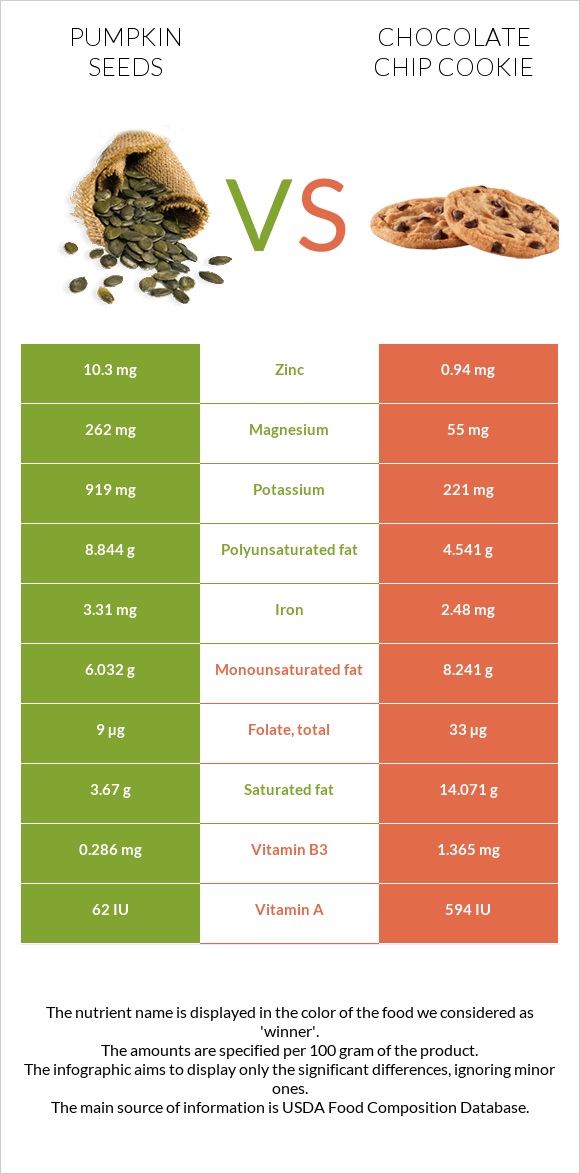Pumpkin seeds vs. Chocolate chip cookie — In-Depth Nutrition Comparison
Compare
Differences between pumpkin seeds and chocolate chip cookie
- Pumpkin seeds have more zinc, magnesium, copper, potassium, and iron, while chocolate chip cookie has more vitamin B1 and vitamin A.
- Pumpkin seeds' daily need coverage for zinc is 85% higher.
- Chocolate chip cookie contains 5 times less magnesium than pumpkin seeds. Pumpkin seeds contain 262mg of magnesium, while chocolate chip cookie contains 55mg.
- The amount of saturated fat in pumpkin seeds is lower.
The food types used in this comparison are Seeds, pumpkin, and squash seeds, whole, roasted, without salt and Cookies, chocolate chip, prepared from recipe, made with butter.
Infographic

Infographic link
Mineral Comparison
Mineral comparison score is based on the number of minerals by which one or the other food is richer. The "coverage" charts below show how much of the daily needs can be covered by 300 grams of the food.
| Contains more MagnesiumMagnesium | +376.4% |
| Contains more CalciumCalcium | +44.7% |
| Contains more PotassiumPotassium | +315.8% |
| Contains more IronIron | +33.5% |
| Contains more CopperCopper | +78.8% |
| Contains more ZincZinc | +995.7% |
| Contains less SodiumSodium | -94.7% |
| Contains more ManganeseManganese | +33.7% |
Vitamin Comparison
Vitamin comparison score is based on the number of vitamins by which one or the other food is richer. The "coverage" charts below show how much of the daily needs can be covered by 300 grams of the food.
| Contains more Vitamin CVitamin C | +50% |
| Contains more Vitamin AVitamin A | +4533.3% |
| Contains more Vitamin B1Vitamin B1 | +441.2% |
| Contains more Vitamin B2Vitamin B2 | +240.4% |
| Contains more Vitamin B3Vitamin B3 | +377.3% |
| Contains more Vitamin B5Vitamin B5 | +362.5% |
| Contains more Vitamin B6Vitamin B6 | +127% |
| Contains more Vitamin B12Vitamin B12 | +∞% |
| Contains more FolateFolate | +266.7% |
All nutrients comparison - raw data values
| Nutrient |  |
 |
DV% diff. |
| Zinc | 10.3mg | 0.94mg | 85% |
| Fiber | 18.4g | 74% | |
| Magnesium | 262mg | 55mg | 49% |
| Saturated fat | 3.67g | 14.071g | 47% |
| Copper | 0.69mg | 0.386mg | 34% |
| Polyunsaturated fat | 8.844g | 4.541g | 29% |
| Protein | 18.55g | 5.7g | 26% |
| Cholesterol | 0mg | 70mg | 23% |
| Potassium | 919mg | 221mg | 21% |
| Selenium | 11.2µg | 20% | |
| Vitamin A | 3µg | 139µg | 15% |
| Fats | 19.4g | 28.4g | 14% |
| Sodium | 18mg | 341mg | 14% |
| Vitamin B1 | 0.034mg | 0.184mg | 13% |
| Iron | 3.31mg | 2.48mg | 10% |
| Vitamin B2 | 0.052mg | 0.177mg | 10% |
| Manganese | 0.496mg | 0.663mg | 7% |
| Vitamin B3 | 0.286mg | 1.365mg | 7% |
| Folate | 9µg | 33µg | 6% |
| Monounsaturated fat | 6.032g | 8.241g | 6% |
| Vitamin B5 | 0.056mg | 0.259mg | 4% |
| Vitamin B6 | 0.037mg | 0.084mg | 4% |
| Vitamin B12 | 0µg | 0.08µg | 3% |
| Calories | 446kcal | 488kcal | 2% |
| Calcium | 55mg | 38mg | 2% |
| Carbs | 53.75g | 58.2g | 1% |
| Phosphorus | 92mg | 100mg | 1% |
| Vitamin C | 0.3mg | 0.2mg | 0% |
| Net carbs | 35.35g | 58.2g | N/A |
| Tryptophan | 0.326mg | 0.072mg | 0% |
| Threonine | 0.683mg | 0.191mg | 0% |
| Isoleucine | 0.956mg | 0.224mg | 0% |
| Leucine | 1.572mg | 0.391mg | 0% |
| Lysine | 1.386mg | 0.214mg | 0% |
| Methionine | 0.417mg | 0.106mg | 0% |
| Phenylalanine | 0.924mg | 0.27mg | 0% |
| Valine | 1.491mg | 0.279mg | 0% |
| Histidine | 0.515mg | 0.123mg | 0% |
| Omega-3 - DHA | 0.003g | N/A |
Macronutrient Comparison
Macronutrient breakdown side-by-side comparison
Protein:
18.55 g
Fats:
19.4 g
Carbs:
53.75 g
Water:
4.5 g
Other:
3.8 g
Protein:
5.7 g
Fats:
28.4 g
Carbs:
58.2 g
Water:
5.7 g
Other:
2 g
| Contains more ProteinProtein | +225.4% |
| Contains more OtherOther | +90% |
| Contains more FatsFats | +46.4% |
| Contains more WaterWater | +26.7% |
~equal in
Carbs
~58.2g
Fat Type Comparison
Fat type breakdown side-by-side comparison
Saturated fat:
Sat. Fat
3.67 g
Monounsaturated fat:
Mono. Fat
6.032 g
Polyunsaturated fat:
Poly. Fat
8.844 g
Saturated fat:
Sat. Fat
14.071 g
Monounsaturated fat:
Mono. Fat
8.241 g
Polyunsaturated fat:
Poly. Fat
4.541 g
| Contains less Sat. FatSaturated fat | -73.9% |
| Contains more Poly. FatPolyunsaturated fat | +94.8% |
| Contains more Mono. FatMonounsaturated fat | +36.6% |





